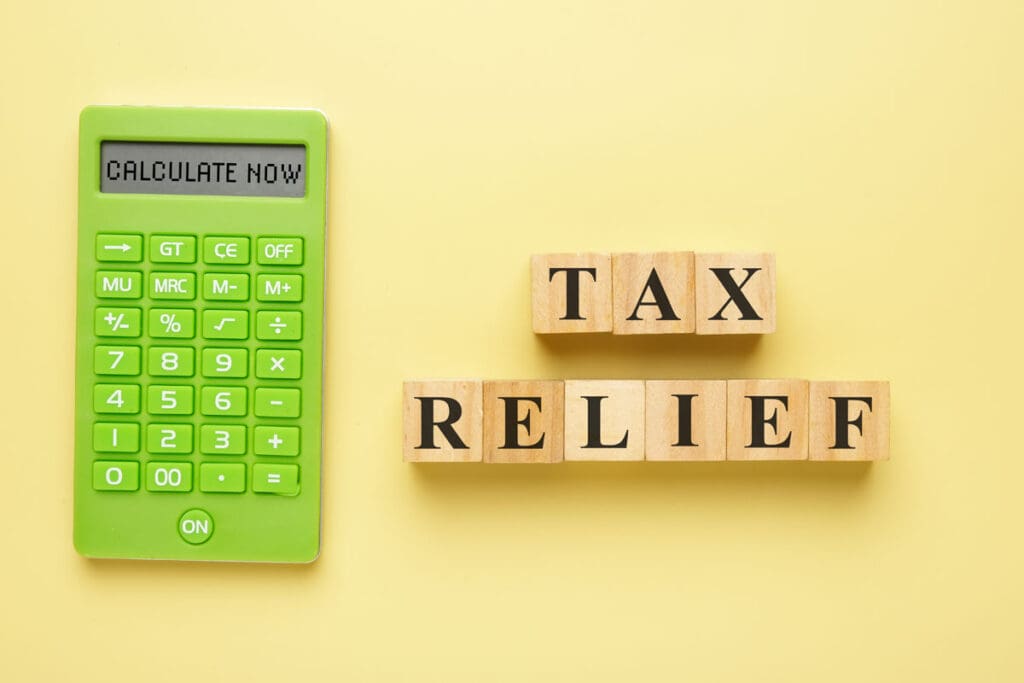Tax relief through the Internal Revenue Service (IRS) is a negotiated and approved way of settling, reducing, or paying off tax debt.
There are four tax relief programs that the IRS provides for taxpayers who are struggling or cannot afford to pay their tax bills. This also includes taxpayers who have overdue tax bills or owe an overwhelming amount.
Read More: Simple Advice: How to Deal With Tax Debt

The 4 Types of Tax Relief the IRS Offers Taxpayers
Because what constitutes the best form of tax relief will vary by situation, the IRS developed 4 separate programs. Each tax relief program is made to adapt to particular situations. Each program works differently. The process is also different depending on an individual taxpayer’s situation.
1. Offer-in-Compromise (OIC)
An Offer-in-Compromise is a method for settling tax debt for less than a taxpayer owes. When we refer to “tax debt” this means the total amount a taxpayer owes, which includes taxes, penalties, and interest.
Taxpayers must have already filed all of their tax returns before applying for an offer-in-compromise.
In determining whether to grant an offer-in-compromise, the IRS will consider the following factors regarding an applicant:
- Ability to pay the tax bill
- Income
- Expenses
- Value of assets
Basic requirements for OIC eligibility:
- Payment of a nonrefundable $205 application fee
- Make a nonrefundable initial payment
- Must not be in an open bankruptcy proceeding
- Current on all tax returns. If any tax returns are not filed, may not qualify
2. Currently-Not-Collectible Status (CNC)
Currently-Not-Collectible Status is a determination by the IRS of taxpayers who cannot reasonably pay their taxes and living expenses.
Taxpayers who find themselves in this situation can apply to the IRS and request a currently-not-collectible status. The IRS will request information to verify your income and expenses to determine eligibility.
The IRS may ask taxpayers to complete one or both of the following forms.
A Collection Information Statement Form
A Collection Information Statement for Wage Earners and Self-Employed Individuals form. Here are some important facts about CNC status.
- CNC status does not remove your tax debt.
- Interest and penalties can still accrue.
- Status is temporary. The IRS may review income annually to see if your financial situation has improved.
- The IRS can still file a lien against you.
- The IRS can and may withhold your tax refunds to pay off debt.
3. Penalty Abatement
This is where the IRS may waive penalties in certain situations. For example, if you received a penalty for failing to file or failure to pay. A penalty abatement will allow you to reverse those penalties. Although it is more difficult to reverse interest charges, you may also be able to reverse those in certain situations. However, if you receive penalty abatement, any interest associated with the penalty will also be forgiven.
“First-time penalty abatement” is one reprieve the IRS offers if you have not had any other penalties imposed during the previous three years.
Qualifying for Penalty Abatement
- You are current on tax return filings. Tax extensions are also acceptable.
- Your tax bill is current or you have a payment plan in place.
- No other penalties during the three years before the year you received a penalty.
4. Installment Agreements
An installment agreement with the IRS will allow you to make penalties on your tax debt over a specified length of time. This includes the total debt of your back taxes, accrued interest, and penalties.
You can apply online using the IRS’s Online Payment Agreement Tool.
Installment agreements come in two types: Short-term and long-term.
Short-Term Payment Plans
To qualify for a short-term payment plan with the IRS taxpayers must meet the following criteria:
- Cannot owe more than $100,000 in combined taxes, penalties, and interest.
- Total tax debt must be paid in full in 180 days or less.
Long-Term Payment Plans
To qualify for a long-term payment plan with the IRS taxpayers must meet the following criteria:
- Cannot owe more than $50,000 in combined taxes, penalties, and interest.
- Will need 180 days or more to pay off total tax debt.
What to Know About IRS Installment Agreements
- Interest and penalties will still accrue until the full amount of your tax debt (taxes, interest, and penalties) are paid in full.
- Taxpayers owing more than $25,000 must make payments via automatic withdrawals from a bank account.
- Debit cards, credit cards, and digital wallet payments are charged a processing fee.
- ACH payments drawn from a bank account are not charged processing fees.
- A setup fee is charged by the IRS for your payment plan. Lower-income applicants may have their setup fees waived.
How to Apply With the IRS Online for Tax Relief
Before applying with the Internal Revenue Service (IRS) online, you’ll need to set up an account. You can also download a “getting started guide” for new users from the IRS. To set up a new account, do the following:
- Go to IRS.gov and select “View Your Account”
- Select the “Log in to your Online Account” button
- Click “Create Account”
- Pass “Secure Access” authentication. You must be able to authenticate your identity to continue to set up an account. Visit: IRS.gov/secureaccess
- Create a profile
In the next section, you’ll find direct links to the four different tax relief programs previously discussed. Choose the type(s) of tax relief you feel you might be best suited for. Using the links in the next section, you’ll find more information about the specific type of tax relief you seek. There are also phone numbers, as well as links to get started in applying for tax relief.
Where to get more tax relief information and contact the IRS:
Use the following links to get information directly from the IRS about its tax relief programs.
- IRS Options for Taxpayers with a Bill They Can’t Pay
- IRS Offer in Compromise
- IRS Currently-Not-Collectible
- IRS Penalty Abatement
- IRS Online Payment Agreement Application
- IRS Tax Return Extension of Time to File
- Applying for Tax-Exempt Status
- IRS Tools for Taxpayers
- Prepare and File Your Taxes Free at the IRS








